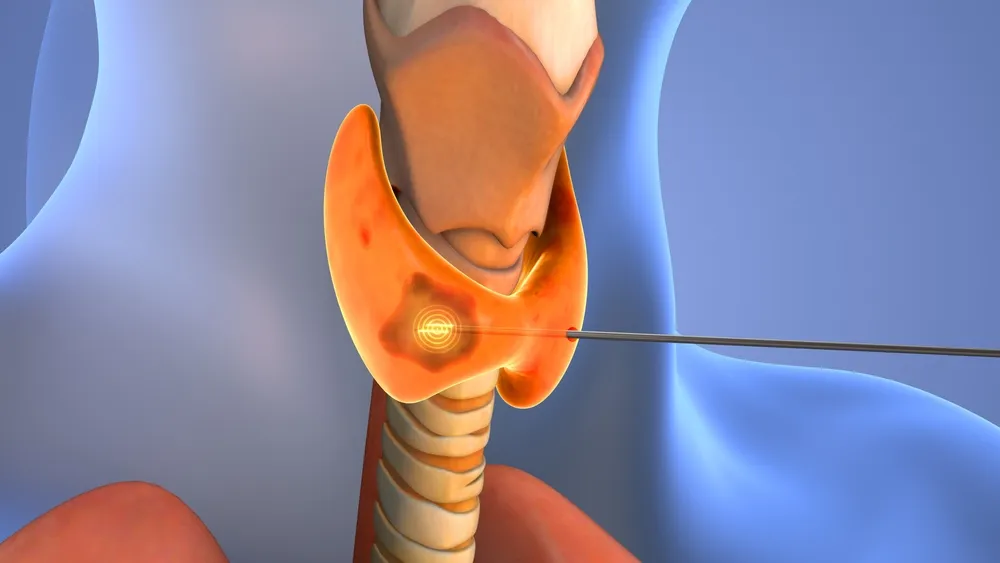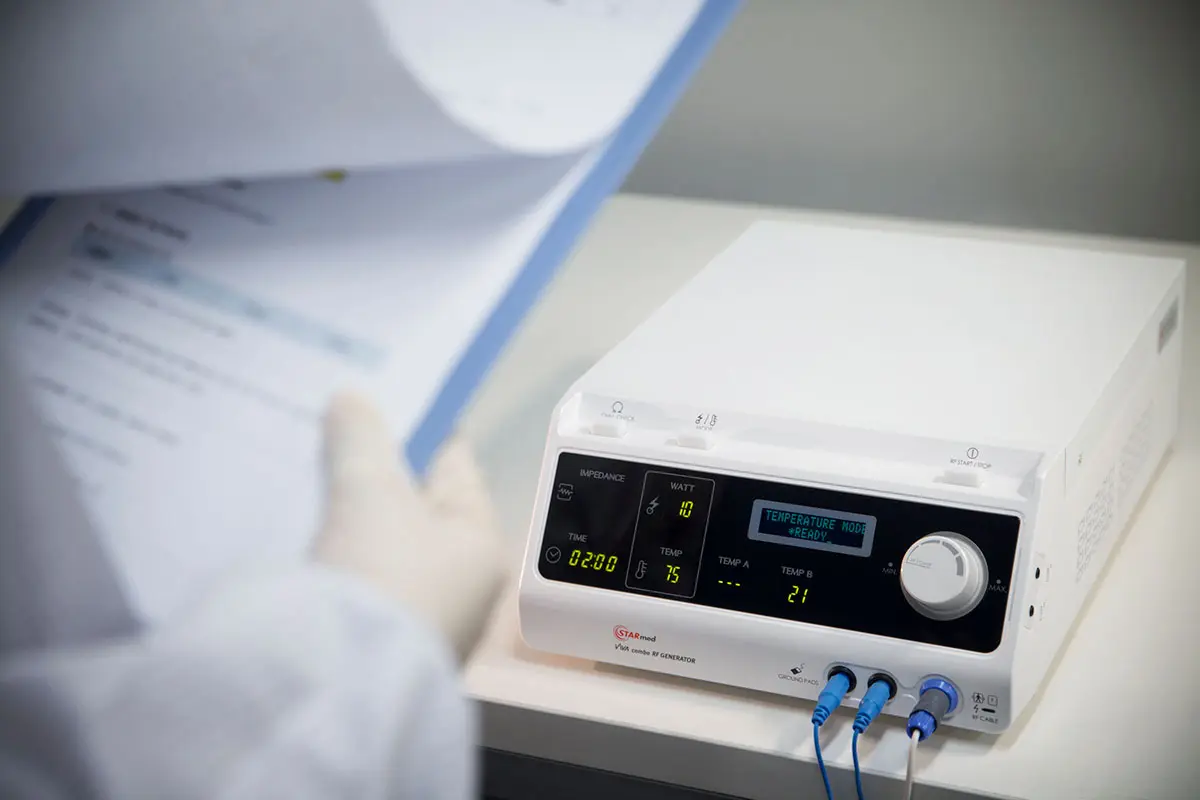Summary:
Thyroid RFA is a minimally invasive procedure offering economic benefits for both clinicians and patients. It reduces healthcare costs, increases patient volume, and improves quality of life. Key factors for adoption include reimbursement policies, clinician training, and patient awareness.
In the United States, surgeons perform over 150,000 thyroid surgeries each year. Many of these procedures are medically necessary. However, for patients with benign thyroid nodules, there may be a less invasive, equally effective option.
Thyroid radiofrequency ablation, or thyroid RFA, is a minimally invasive outpatient procedure that preserves healthy tissue and eliminates the need for lifetime medications. RFA is performed under local anesthesia. As a result, ablation makes safe and efficient treatment accessible for patients of all ages, including those who might be poor candidates for surgery. It takes as little as 30 minutes, with very little downtime and a brief recovery period compared to surgery.
Many patients agree that the convenience, efficacy, and comfort of the thyroid RFA procedure improved their quality of life.
Obtaining new equipment and learning a new procedure does require an investment. However, medical professionals believe that the thyroid RFA procedure will have a high ROI. Ultimately, it might be a more financially viable option for patients and clinicians alike.
Continue reading to learn the potential economic benefits of thyroid RFA.
The Economic Impact of Thyroid RFA on Clinicians
Thyroid radiofrequency ablation offers several potential economic advantages for trailblazing clinicians.
Versatile and Cost-Effective
RFA generators are compact and can be kept in standard treatment rooms. Our generator works with a range of ultrasound machines and imaging systems. You should be able to seamlessly integrate this technology into your office workflow without significant disruptions and other additional investments.
Increased Patient Volume
Thyroid RFA is an in-office, outpatient procedure. Thus, clinicians can see patients in-office. As the procedure rarely takes longer than one hour, this allows clinicians to see more patients in a day.
Factors such as increased appointment availability contribute to patient satisfaction. Patients are more likely to be satisfied with your services and, thus, to return for future appointments.
Revenue Generation
Reimbursement rates for the thyroid RFA procedure can vary. Thyroid RFA will receive its dedicated CPT codes in early 2025.
We are the only company on the market that partners with a third-party professional reimbursement group to help you with reimbursement questions. They can advise you on preauthorization and appeals.
As a result, you will generate the revenue you deserve for offering a state-of-the-art procedure at your practice.
Patient Satisfaction and Word of Mouth
If given the option, most patients would opt for a less invasive procedure, especially if it eliminates the need for lifetime medications. Though tens of thousands of successful procedures have been performed since 2002, many patients may not know a non-surgical option exists. Patients who come to RFA providers for a second opinion will be relieved to learn about a non-surgical option.
Based on a large, multicenter study6, the total complication rate for thyroid RFA is just 3.3%. It has a major complication rate of 1.4%. The vast majority of patients are satisfied with their outcomes. In fact, a two-year study 7 on this technology found patients who underwent thyroid RFA instead of surgery reported improved quality of life.
Satisfaction can ultimately lead to positive patient reviews and even word of mouth. As 1 in 8 women will develop a thyroid disorder in her lifetime, this is a positive and effective way to attract new patients.
The Economic Impact of Thyroid RFA on Patients

Reduced Healthcare Costs
On average, thyroid RFA costs less than traditional surgery. RFA patients typically have lower hospital and anesthesia costs, reduced medication needs, and shorter recovery times. Even a faster return to work can have a large economic impact on some patients, making the outpatient procedure the more financially viable option.
Improved Quality of Life
Thyroid RFA patients typically experience less pain and minimal scarring compared to thyroidectomy patients. Patients are typically satisfied with the cosmetic outcomes of the volume reduction procedure.
Most significantly, patients get to keep their thyroid and avoid long-term hormone supplementation. As a result, patients are less likely to have long-term calcium problems caused by lifetime medications. Overall, thyroid RFA patients report a positive quality of life.
Potential Long-Term Savings
Long-term benefits of RFA for the thyroid, such as avoiding complications associated with surgery and the potential for thyroid function preservation, can result in significant cost savings over time.
Economic Factors Impacting the Thyroid RFA Adoption Rate
Several economic factors play a role in the adoption rate of the thyroid radiofrequency ablation procedure, including:
- Reimbursement policies for thyroid RFA vs surgery
- The availability of adequately trained clinicians
- Patient awareness of the procedure
At STARmed, we work with clinicians to help mitigate these obstacles, making it financially feasible to adopt thyroid RFA in their practices. We offer services like STAR Support, which includes marketing and reimbursement services to help navigate billing and outreach. We provide resources and ideas for educating patients about the benefits and risks of the procedure. As a result, STARmed clinicians see more demand, increasing their bottom line.
Our STARmed Academy offers both remote and in-person training for those interested in learning to master the thyroid RFA procedure. We believe the availability of adequately trained physicians is crucial for the successful implementation of RFA. Thus, we offer reliable, real-time clinical support to all STARmed clinicians.
If you’re interested in implementing thyroid RFA in your practice, contact us to learn how we can help.






2 Responses
This blog does a great job highlighting the economic benefits of thyroid RFA in healthcare. The detailed analysis of cost savings and patient outcomes is insightful and well-researched. It’s exciting to see how advancements like this can reduce surgical interventions and improve recovery times. Great work on presenting complex data in a clear and engaging way!
thanks for info.